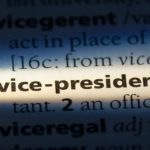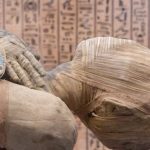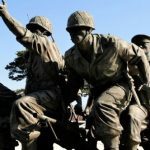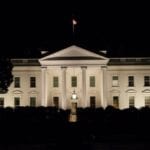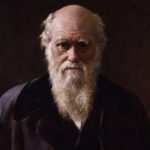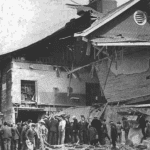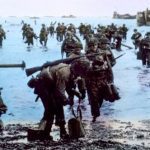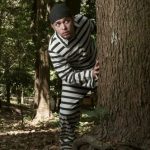 History
History  History
History  Health
Health 10 Everyday Activities That Secretly Alter Consciousness
 History
History Top 10 Historical Disasters Caused by Someone Calling in Sick
 Animals
Animals 10 New Shark Secrets That Recently Dropped
 Movies and TV
Movies and TV 10 Forgotten Realities of Early Live Television Broadcasts
 Technology
Technology 10 Stopgap Technologies That Became Industry Standards
 Weird Stuff
Weird Stuff 10 Wild Facts About Taxidermy That You Probably Didn’t Know
 Travel
Travel 10 Beautiful Travel Destinations (That Will Kill You)
 Miscellaneous
Miscellaneous 10 Modern Marriage Rituals Born from Corporate Branding
 Weird Stuff
Weird Stuff Ten Bizarre Visions of 2026 from Fiction
 History
History 10 “Modern” Problems with Surprising Historical Analogs
 Health
Health 10 Everyday Activities That Secretly Alter Consciousness
 History
History Top 10 Historical Disasters Caused by Someone Calling in Sick
Who's Behind Listverse?

Jamie Frater
Head Editor
Jamie founded Listverse due to an insatiable desire to share fascinating, obscure, and bizarre facts. He has been a guest speaker on numerous national radio and television stations and is a five time published author.
More About Us Animals
Animals 10 New Shark Secrets That Recently Dropped
 Movies and TV
Movies and TV 10 Forgotten Realities of Early Live Television Broadcasts
 Technology
Technology 10 Stopgap Technologies That Became Industry Standards
 Weird Stuff
Weird Stuff 10 Wild Facts About Taxidermy That You Probably Didn’t Know
 Travel
Travel 10 Beautiful Travel Destinations (That Will Kill You)
 Miscellaneous
Miscellaneous 10 Modern Marriage Rituals Born from Corporate Branding
 Weird Stuff
Weird Stuff Ten Bizarre Visions of 2026 from Fiction
10 Facts about American Presidents You Never Learned in School
There is plenty we know about America’s past presidents. These men all served their country for four (or more) years in the highest office in the land and made difficult decisions about all kinds of domestic and international issues. Many, like George Washington and Franklin Delano Roosevelt, are well-known by all and studied regularly in history and civics classes. On the other hand, others, like Martin Van Buren and William Henry Harrison, have been mostly forgotten by today’s amateur historians and casual readers.
But regardless of their impact on the modern world and the legacy of their terms in office, all these men had countless fascinating things about them. Sure, their policies and decisions will be forever recorded in history. But away from the news-making aspects of their careers, there was so much more going on in each of their lives. In this list, we’ll take a look at ten random, unexpected, and interesting tidbits from the president’s past. These aren’t facts you were likely to learn in history class!
Related: 10 Political Conspiracy Theories That Would Actually Make Sense
10 James Monroe Ran Unopposed
When the 1820 election rolled around, James Monroe and his running mate, Daniel D. Tompkins, were exceptionally popular all up and down the fledgling nation. We don’t just mean, like, 55% or 60% of people felt like they’d do a decent job with a second term. We mean that every single electoral college vote was cast for Monroe and Tompkins—except for one! In fact, the race was such a clear blowout from the start that Monroe didn’t officially face any opposition in the election. George Washington had been elected president in a solo race at the beginning of America’s ascendancy, too. But after Monroe ran unopposed, it never happened again.
In every single state, all but one electoral vote went for Monroe to lead in a second term. The one non-Monroe vote was faithless elector William Plumer, who cast his ballot for John Quincy Adams. But since Adams wasn’t even running, that was more symbolic than anything. For the rest of the country, there was never any question that Monroe would be re-elected without any competition and having enjoyed nationwide popularity.
One interesting tidbit to Monroe’s historically unique unopposed re-election: He (and Tompkins as VP) were actually the last pair of running mates to enjoy a second term as an incumbent ticket for a full century afterward! Between Monroe’s 1820 win versus no competition and 1916’s Woodrow Wilson’s re-election with Thomas R. Marshall as VP, no incumbent president was able to get re-elected. Considering how many incumbents have re-upped in recent decades, that was certainly a strange trend through the 19th century.[1]
9 George Washington Bred Dogs
George Washington may be best known as a Revolutionary War hero who became America’s first president. After serving from 1789 to 1797, he was pretty much a made man in society back then—and an unquestioned legend that remains world-famous now. We know all the made-up myths and true stories about him, too: chopping down the cherry tree, crossing the Delaware, wooden teeth, and serving the American people in their time of need. But did you know Washington had a side hustle that he was incredibly passionate about beyond all that?
The U.S.’ first president was an esteemed dog breeder at his Virginia home. He bred a variety of foxhounds that he called the “Virginia hound,” and he was prolific in putting together dog pairs and breeding new pups. In his personal writings, Washington named nearly three dozen foxhounds that he’d carefully and purposely bred at his northern Virginia estate of Mount Vernon. Some had incredible names, too. There was True Love, Tipster, Sweet Lips, and even one dog named Drunkard.
Washington’s dog legacy lives on, too. Today, the American Kennel Club credits Washington himself as being the father of the American foxhound breed. The first president was so esteemed in his 18th-century breeding, in fact, that even now, he is credited with influencing other dog breeds like the American English coonhound, the treeing Walker coonhound, and the bluetick coonhound, too. That’s quite a legacy![2]
8 John Quincy Adams Did Good
John Quincy Adams served as president for four years, from 1825 to 1829. But long after he left the White House and backed away from political life, he was still working as a lawyer. And he was very much still impacting American history in ways that would continue to be discussed, felt, analyzed, and honored centuries later.
On November 25, 1841, nearly three dozen former American slaves were returned to West Africa after a Supreme Court decision determined they ought to be freed and sent home. That decision centered around the infamous Amistad case, in which a group of slaves riding in a slave ship bound for the Western Hemisphere had rebelled against their captors. What ensued—even beyond the violent rebellion itself—was a legal path that wound its way up to the highest court in the land.
Well, if you haven’t guessed it by now, the lawyer who was instrumental in securing the freedom of those would-be slaves was none other than John Quincy Adams. More than a decade after having left office, Adams stood before the nation’s highest-level judges and argued that the slaves ought to be freed and repatriated. His argument came through, and Adams’s side won.[3]
7 Martin Van Buren Was Born Here
What do you know about Martin Van Buren? Chances are, you probably don’t know much. America’s president from 1837 to 1841, Van Buren had a forgettable time in office where he accomplished relatively little compared to many of the leaders who came before him. His policies were also seen as directly leading to a very serious economic downturn at the time. And then, he was trounced when he went up for re-election. His defeat in 1841 was so bad, in fact, that he even failed to win his home state. By the end of his presidency, Van Buren was known by vocal critics and despairing supporters alike as “Martin Van Ruin.” Oops!
But there is one thing that Van Buren did that no president before him had ever done: He was born in the United States. That may seem like a simple thing for this day and age, considering the fact that presidential candidates now are constitutionally required to have been born in the nation they wish to lead. But back when the U.S. was first founded, that was impossible. After all, the country’s founding fathers were born in England or elsewhere—or they were born in the New World but technically as British subjects since their birth dates came before 1776. So none could claim to be “native” to their new nation.
That trend persisted for decades until Van Buren took office. He was born in a small village in New York in 1782, a few years after independence was declared and the first future president to be born a “real” American. That the rest of his presidential legacy is so poor doesn’t quite tell the whole story here, then. At least he was a (good) pioneer at something, even if only by birth![4]
6 William Henry Harrison Barely Registered
We can sort of forgive you if your first reaction to hearing the name “William Henry Harrison” is to respond with “who?” Harrison was the ninth president of the United States, but he practically doesn’t count. He was elected fair and square and all—he replaced the aforementioned “Martin Van Ruin” in the campaign of 1841—but upon assuming office, he died almost immediately. In fact, Harrison holds the all-time record for the shortest-ever presidential term. Just 31 days after his inauguration in the spring of 1841, he got sick and died.
Harrison was born in 1773 in Virginia, just before the American Revolution. He was a military soldier and, later, an officer in his youth. Then, he transitioned into politics. Among other positions, he was the first-ever governor of the Indiana Territory, a congressman from Ohio, and a U.S. Senator representing Ohio. So he was experienced in the machinations of Washington when it came to his turn to reside in the White House. It wasn’t meant to be, though, and after just about six weeks in power, he croaked. In turn, Vice President John Tyler quickly took over his gig.[5]
5 That’s a Lot of Babies
John Tyler, who was initially William Henry Harrison’s vice president, was unexpectedly pressed into duty after the leader’s death one month into his term. If Tyler was stressed out about the opportunity, he didn’t let it be known. Instead, he pushed to take on Harrison’s intended policies and enact many of his own. He then served for the next four years in office before heading back to private life forever after.
But we like to think that the real reason Tyler wasn’t stressed about taking over for Harrison is because he had already known real stress. That is, Tyler fathered 15 children during his lifetime. Fifteen! Not only is that an insanely large brood, but it is also officially the most children ever fathered by any American president. After dealing with more than a dozen screaming little ones, mischievous toddlers, and whiny teenagers, how bad could taking on the duties of the presidency really be?[6]
4 Zachary Taylor Didn’t Vote
Zachary Taylor was a legitimate military hero after he led American forces into a hard-fought and well-earned battlefield victory at Buena Vista during the Mexican-American War. The military expert and wise strategist didn’t concern himself with politics during the early parts of his life, instead choosing to conquer new territory for his nation and dominate those he felt were lesser. But Buena Vista changed everything for him—at least from a popularity perspective.
In just a few short weeks after news of Buena Vista got back to the eastern seaboard, Taylor’s Mexican-American War prowess became fodder for a burgeoning political career. Essentially overnight, calls sprang up for “Old Rough and Ready,” as he was known, to turn to politics and lead the country beyond the battlefield.
There was just one problem with that: Nobody knew quite what his politics were. Taylor had never revealed them, in part because he had never before voted. In fact, right up until when he ran for and then won the presidency in 1849, he still hadn’t voted in any election! We hope he voted for himself that year… but can we really be sure?[7]
3 Andrew Johnson Had Tiny Friends
Andrew Johnson didn’t initially expect to be the president of the United States. In fact, he only assumed the job after Abraham Lincoln was assassinated in 1865. Johnson had been vice president, and was intending to fulfill those duties when tragedy struck with Honest Abe. So it was a bit of an unexpected development when Johnson moved into the White House in the spring of 1865. And once he got there, he did something even more unexpected: He befriended a family of mice.
See, most presidents before Johnson—and certainly the vast majority of presidents who have come after him—had a White House pet that they looked after. Most often a dog, but also commonly a cat, these pets live a life of luxury. Johnson didn’t feel that way about animals, though. He had no pets and brought none to the White House with him. But he wasn’t alone!
Once he moved in, he noticed there was a family of mice living inside the iconic political home. Prior presidents had moved to exterminate the pestering little critters, either with mouse traps or cats on the property. But not Johnson! The new president took to caring for the little guys. He looked after them, protected them, and made sure they were fed well. He even adorably took to referring to them as “the little fellows” in his correspondence. Such as it was, that proved to be a presidential first![8]
2 Fate Nearly Befell Ulysses S. Grant
When Ulysses S. Grant assumed office in 1869, he reached the top rank after a long career in the military. Of course, his calling card in his many army-related roles was as a Union general during the recently fought Civil War. So countless Americans knew him and admired (in the North) or detested (in the South) his work in fighting for the soul of the country and securing its future during that tumultuous time.
Grant’s life trajectory could have completely changed right near the very end of the war, though. On the fateful evening of April 14, 1865, Abraham Lincoln and his wife invited Grant and his better half to Ford’s Theatre to take in a show. Grant and his spouse were unfortunately forced to decline, as they had already made plans to visit their children in New Jersey at the time.
As we all well know, Lincoln and his lady opted to head to the theater alone, and tragedy befell Honest Abe in those box seats. How different might postbellum America have been had Grant also been there on the night of the assassination?[9]
1 Who’s Calling?
On May 10, 1877, President Rutherford B. Hayes decided to install the White House’s first-ever telephone. It was just a little over a year before that when Alexander Graham Bell had first successfully completed a phone call. So, in that way, the White House was very much a pioneering place to push out the latest technology at the time. Hayes wanted to have a line on hand to speak with people from afar, and he saw the value in that new tech and what it could mean for communication around the country one day.
So he ordered his advisers to install a bulky new phone in the house’s telegraph room. These were so far in the early days of phones that the White House’s number was “1.” That’s it. Just the single digit and nothing else. Area codes wouldn’t be put into common use for nearly a century after that. To be fair, phones, in general, wouldn’t be really used for years after Hayes’s foresight.
The White House was one of the earliest adopters of the technology, and thus, they had practically no one to call. About a year later, after the Pennsylvania Avenue installation, though, a sizable telephone exchange was set up in Connecticut. And from there, well, that was all she wrote—er, called.[10]
